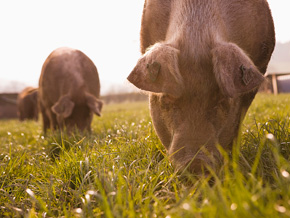Greening the Other White Meat

In our blogging journey through everyday things, we've covered your morning routine—from workout to shower, from coffee to cubicle.
Now it's lunchtime, baby. Panda Garden. Porky goodness. Moo shu style.
The "other white meat" in your takeout container falls behind beef and chicken in American consumption, but we do pig out on pig—on average, each of us consumes 51 pounds of Wilbur annually. That translates to a big impact on our water and air.
Due to the high variety of bacteria, worms and other undesirables in pig flesh, and because of the quick-spreading disease potential of crowded pig farms, heavy doses of antibiotics are administered routinely. Those same drugs end up in your body via waste streaming into our water supply and, via that, moo shu pork to go. Other side dishes you might not have ordered include growth hormones to encourage meat-heavy livestock and vaccines injected to avoid profit-damaging disease.
The crowded piggies also contribute to climate change by emitting methane air pollution, otherwise known as farting.
But the real travesty of pig farms, as you may have heard, is their contribution of dangerous phosphate and nitrate levels to our water supply. Large, corporate pig farms are home to deep vats of untold tons of pig crap, called "lagoons," which regularly overflow or seep past inadequate lining into the earth. The bad stuff in pig manure is associated with stomach cancer, blood oxygen disorders and other health ailments.
We won't go into the ethics of eating meat to begin with—just yesterday we enjoyed a savory ham cheesecake with red pepper jelly, the precubed ham being delicious yet of unknown origin. But as a rule, we try to limit our meat intake and purchase it from local ranchers who raise livestock humanely (some may say there's no humane way to raise an animal for slaughter), hormone-free and with minimal or no antibiotics. Big, corporate pig farms are responsible for the bulk of this industry's environmental offenses.
Not all corporations are, um, pigs. Burrito peddler Chipotle gets its pork from ranches in California and the Midwest that raise antibiotic-free hogs fed vegetarian diets and allowed to graze freely. The restaurant's website includes videos on their pork sources—definitely worth watching Paul Willis talk about his eco-friendly Iowa operation. (Simran visited this farm and saw the little piglets and their mamas. As sweet as they were, the trip did not dissuade her from dining on swine but did convince her that her pig-outs had to be sustainable.)
Cheap, responsible meat options are out there, allowing you to feel better about what's between your chopsticks.
Speaking of chopsticks, we'll break them apart next time.
Now it's lunchtime, baby. Panda Garden. Porky goodness. Moo shu style.
The "other white meat" in your takeout container falls behind beef and chicken in American consumption, but we do pig out on pig—on average, each of us consumes 51 pounds of Wilbur annually. That translates to a big impact on our water and air.
Due to the high variety of bacteria, worms and other undesirables in pig flesh, and because of the quick-spreading disease potential of crowded pig farms, heavy doses of antibiotics are administered routinely. Those same drugs end up in your body via waste streaming into our water supply and, via that, moo shu pork to go. Other side dishes you might not have ordered include growth hormones to encourage meat-heavy livestock and vaccines injected to avoid profit-damaging disease.
The crowded piggies also contribute to climate change by emitting methane air pollution, otherwise known as farting.
But the real travesty of pig farms, as you may have heard, is their contribution of dangerous phosphate and nitrate levels to our water supply. Large, corporate pig farms are home to deep vats of untold tons of pig crap, called "lagoons," which regularly overflow or seep past inadequate lining into the earth. The bad stuff in pig manure is associated with stomach cancer, blood oxygen disorders and other health ailments.
We won't go into the ethics of eating meat to begin with—just yesterday we enjoyed a savory ham cheesecake with red pepper jelly, the precubed ham being delicious yet of unknown origin. But as a rule, we try to limit our meat intake and purchase it from local ranchers who raise livestock humanely (some may say there's no humane way to raise an animal for slaughter), hormone-free and with minimal or no antibiotics. Big, corporate pig farms are responsible for the bulk of this industry's environmental offenses.
Not all corporations are, um, pigs. Burrito peddler Chipotle gets its pork from ranches in California and the Midwest that raise antibiotic-free hogs fed vegetarian diets and allowed to graze freely. The restaurant's website includes videos on their pork sources—definitely worth watching Paul Willis talk about his eco-friendly Iowa operation. (Simran visited this farm and saw the little piglets and their mamas. As sweet as they were, the trip did not dissuade her from dining on swine but did convince her that her pig-outs had to be sustainable.)
Cheap, responsible meat options are out there, allowing you to feel better about what's between your chopsticks.
Speaking of chopsticks, we'll break them apart next time.
More from Simran Sethi






